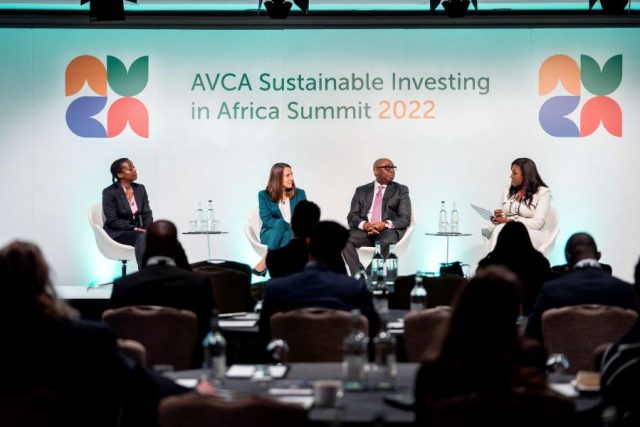
FRI, 21 OCT, 2022-theGBJournal| The African Private Equity and Venture Capital Association’s (AVCA) inaugural Sustainable Investing in Africa Summit opened in London yesterday, convening over 150 key private equity and venture capital stakeholders from around the globe. The event championed the industry’s growth and evolution, key players, and collective action required to increase investment in equality, diversity, and Africa’s new green economies.
Abi Mustapha-Maduakor, Chief Executive Officer, AVCA, opened the summit by setting out the imperative to pair private capital with purpose, describing it as an area where “African investors have been paving the way on sustainable investing for decades”. Concluding the opening address, she also announced that AVCA will be partnering with the Tony Blair Institute for Global Change to produce a comprehensive report that maps Africa’s climate policy landscape and the level of green investment from the private capital industry being channelled to the continent’s 54 economies.
The panel, Profiting from Parity: Closing Africa’s Gender Gap saw participants including Anne-Marie Levesque, Director, Gender & Impact Management, FinDev Canada consider the unique opportunities that the continent presents for gender-lens investing. Despite suggesting that gender and diversity finance should not be limited to women-led businesses, Matthew Davies, Chief Executive Officer, Renew Strategies said: “It’s important that our industry is intentional about ensuring that female-led businesses are provided the capital they need to succeed. We need to achieve at least 50% parity before 2030.”
‘Tokunboh Ishmael, Co-Founder and Managing Director, Alitheia IDF and Lindsey Wallace, Senior Vice-President, Strategy & Impact, Mennonite Economic Development Associates, pledged to leverage their convening power to ramp up investment for gender and diversity finance across the continent. Commenting on the evolution of gender-lens investing, Ishmael said: “We need to move from billions to trillions, and integrate net-zero commitments with this mission.”
A session unpacking the rise of sustainable investment platforms marked a focal point of the day. During the panel, Africa at the Forefront of Sustainable Investing Globally, Wale Adeosun, Founder & Chief Executive Officer at Kuramo Capital, highlighted the DFI’s anchoring role investing in Africa from as early as the 1970s. He also advocated for GP-LP strategies to back the creation of novel technologies and industries for the next generation.
Karima Ola, Partner, LeapFrog Investments, described how the popularisation and evolution of impact investing has been characterised by developing the DFI toolkit towards “intentionality” to solve local priorities, generating sustainable returns and opportunities with businesses. Ola and fellow panellists shared success stories involving the presence and performance of sustainable investing in Africa compared to insights from other emerging markets. Alison Klein, Manager Private Equity, FMO commented on Africa’s just transition and suggested that “Climate intention does not mean we can’t finance expansion in job creating sectors. It is important we develop a holistic view and utilise synergies that improve resource efficiency and economic output such as manufacturing, for example.”
These perspectives were followed by a session where next-generation founders, entrepreneurs, impact investors, and philanthropic players advancing sustainable growth across the continent discussed challenges and practical solutions for investing and innovating for social change. Panellists on the Sustainability In Practice panel included Frank Aswani, Chief Executive Officer, African Venture Philanthropy Alliance. He raised the importance of mobilising local pools of capital through innovation with financial instruments to support high-potential markets in Africa at a time of global uncertainty and instability.
During the panel Digitalisation: The Last Mile in Unlocking Sustainable Development, Shruti Chandrasekhar, Regional Lead, Africa, Disruptive Technologies & Funds, International Finance Corporation discussed the prospects of an emerging circular economy on the continent, and advised that a “unique aspect of Africa means that we’re not only fixing something that already exists but building something new and recognising that the most productive way to do that is to integrate sustainability into solutions”.
At the Financing Africa’s Climate Transition: Mitigation & Adaptation panel, Tariye Gbadegbesin, Managing Director & Chief Executive Officer, ARM Harith, drew the delegates’ attention to the need to define an adaptation framework and the feasibility of a co-benefits approach that yields outcomes in both climate change mitigation and adaptation. The panel also explored how international investment can be applied to co-investments that encourage domestic capital and support the entry of institutional investors, including pension funds, now increasingly moving into Africa’s impact space.
The Making Impact Meaningful panel assembled high-level voices from DEG, Meridiam, UN PRI, and WHO Foundation to debate how the industry can overcome greenwashing to establish detailed and context-specific metrics for sustainable investing that unify diverse approaches to how stakeholders in the private capital industry can monitor and measure social and environmental impact.
The closing session saw industry figures such as Adam Hadidi, Founder & Managing Director, BluePeak Private Capital, reflect on how collective efforts such as GP-LP structures, green bonds, and digital and crowdfunding platforms can be deployed to maximise sustainable investing. Opuiyo Oforiokuma, Senior Partner, Africa50, concluded: “Africa cannot ignore climate change simply because we are only responsible for 4% of global emissions. Asset recycling in green assets can be used as a mechanism to bring in more capital in green infrastructure”.
Twitter-@theGBJournal| Facebook-The Government and Business Journal|email: gbj@govbusinessjournal.ng|govandbusinessj@gmail.com









